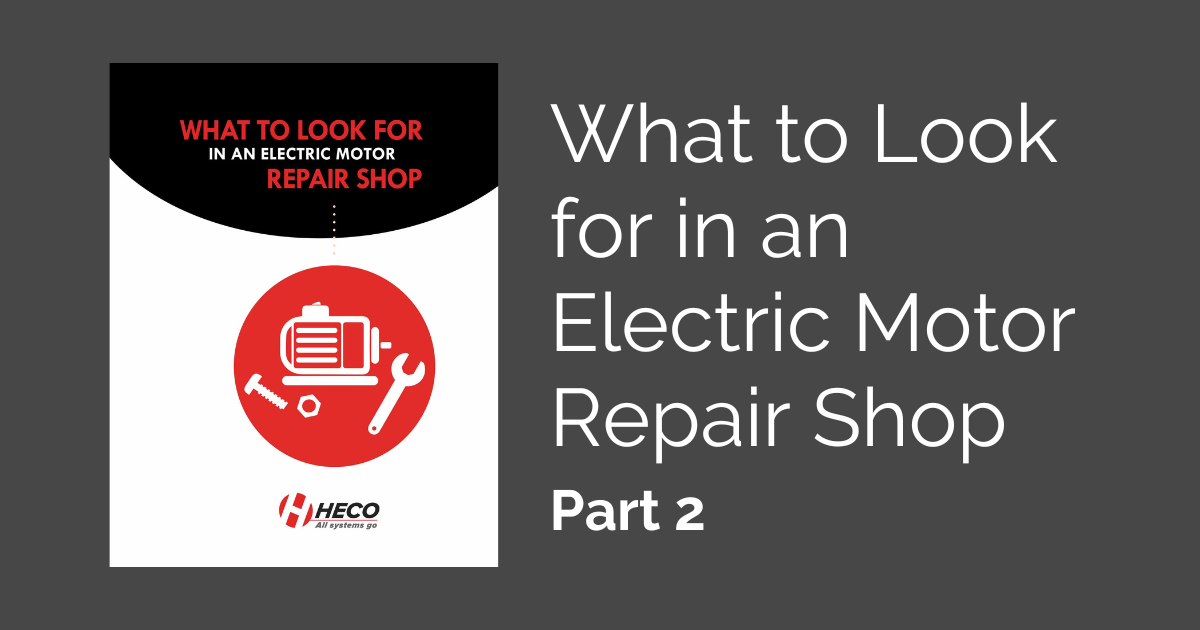What to Do Before Choosing a New Electric Motor Repair Shop, Part 2 – Set Your Expectations - HECO
February 8, 2023
When your motor shows signs of impending issues or is completely unusable, panic often leads operators to call the fastest or cheapest repair shop. While the shutdown-induced, knee-jerk reaction is understandable, it is not advisable.
As HECO previously shared, defining the problem and preparing your specifications are the most important steps to take when selecting a new electric motor repair shop to work with. Once you’ve done that homework, it’s time to ask yourself 10 specific questions.
Being prepared and setting your own expectations will help you find a repair partner that is committed to long-lasting, quality systems and efficient operations and ultimately help ensure that you get the service you want and need.
1) Are your specifications set up for short- or long-term fixes?
What is expedient may not be what’s best. You could save 20% on a repair now, but if the motor needs to be repaired again in two years, you might not be getting that far ahead. A more expensive repair could last 10 or 15 years.
When you do the math, a more costly and time-intensive repair might be the better option. The more you have invested in a motor, the more important it is that the repair specs prioritize long-term fixes.
2) Is a repair really less expensive than buying new?
Sometimes a motor isn’t worth the time and money to repair, and it’s better to just replace it with a new one. Think of it like computer printers. You can repair one for $100 or buy a new one for $50.
Make sure your vendor isn’t inflating the price of a new motor just to get the repair business.
3) Is your existing older motor better than an equivalent new motor?
Manufacturing has changed from 10, 20, and 30 years ago. A thorough assessment needs to be performed to evaluate how your existing motor stacks up against its newer counterparts and ensure which is the best choice.
For larger motors, you need to ask, “How long has this motor been in operation?” The older motors have more engineering overdesign and mass, and, in many cases, provide a better, longer-lasting solution.
4) Did you include lead time as part of the spec?
Whoops, big mistake. If time is so critical, you don’t need a spec, you need a magician.
Potential vendors don’t even know what is wrong with it yet. Agreeing to a schedule without proper diagnosis would just be guesswork.
5) Is the repair method right for the entire system?
Many times when a motor breaks, it’s not the motor’s fault. Another malfunction somewhere in the powertrain could be causing the motor failure.
The best vendors aren’t interested simply in what needs to be fixed; they want to know why it failed in the first place.
6) Will the motor be inspected before it leaves the repair center?
Let’s say you have a 4,000-volt motor being repaired. The vendor needs to run that motor at 4,000 volts before it leaves the shop or you’re not getting a true test of the repair.
7) Does the vendor require specs before starting?
You’d be surprised at how often vendors don’t require specs. The results are usually not so good.
Some vendors don’t believe they need specs from the customer. Their attitude is, “I’ll just do it the way I always have.” Then, when the motor fails again (and it will), nobody knows why because nobody knows what spec it was repaired to.
8) Does the vendor ask “why”?
You want a vendor that asks questions about the spec to be sure your needs and wants are clear to begin with. You want a partner who wants to know “why” a problem occurred, not just “what” you need to have done.
The best vendor brings new ideas and solutions to the table. If they don’t, and simply agree with everything you say without question or providing additional suggestions and insight, you may want to pull the plug now rather than later.
9) Can the vendor repair to the spec?
One of the first things in determining whether the vendor can actually do what they say is to have them fill out an audit form. This form should detail things such as what kind of equipment they have, who they subcontract to, and what their experience is in your industry.
10) Who owns the vendor?
Is the repair vendor owned by an individual, a family, or a private equity firm? Are the owners easily accessible? Do they have skin in the game?
No matter what vendor you select, you may not be one of their biggest customers. And you don’t have to be as long as you feel like one of the most important!
All Systems Go
At HECO, we understand the value of doing repairs well, proactively, and with the longevity of your equipment and investment in it to date in mind. With us as your partner, we’ll bring up these questions even if you forget to!
For more information about selecting a vendor, download HECO’s What to Look for in an Electric Motor Repair Shop e-book.
Contact us today to learn more about our electric motor repair services and expertise.
The What to do Before Hiring a New Electric Motor Repair Shop blog series also includes Part 1 – Do Your Homework.
The series will conclude with Part 3 – Assemble Your Team.
Subscribe to the HECO blog for enews alerts about new posts!
Posted in Repair
